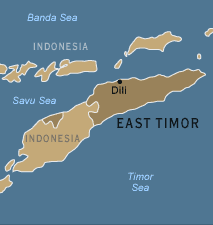1. Constitutional History
In March 2002 East Timor’s first constitution was implemented.
2. Type of Government
East Timor is a republic with a parliamentary government. The prime minister and head of government is Mari Alkatiri. The president and chief of state is Xanana Gusmao; the unicameral national parliament has a minimum of 52 and a maximum of 65 seats, and its members are elected by popular vote to serve five-year terms; the Supreme Court of Justice is the country’s highest court.
3. Process for Drafting and Ratification
The elected constituent assembly was allowed 90 days by the U.N. to write East Timor’s constitution, which it then ratified in March 2002.
4. Assistance From International Agencies
The Transitional Administration in East Timor (UNTAET) was established in 1999 to help East Timor attain and maintain independence. Following independence, the U.N. Mission for the Support of East Timor (UNMISET) was established in May 2004 to help ease East Timor’s transition to self-government.
The Portuguese colony Timor became the Indonesian province of East Timor in July 1976. The next two decades brought with them extreme violence and political turmoil as an estimated 100,000 to 250,000 individuals lost their lives fighting Indonesian occupation. On August 30, 1999, 78 percent of the people of East Timor voted for independence.
Indonesian occupation of East Timor was characterized by brutal military repression but it was also defined by East Timor’s substantial dependence on Indonesian rule. When the U.N. stepped in to help East Timor out of it’s dependence, in many ways UNTAET simply supplanted Indonesia as the governing force upon which East Timor depends. UNMISET provides security and all manners of advisory services for the new government, in addition to overseeing drafting of the constitution and providing military and political support during elections. As Asia’s poorest country (G.D.P. $478) the challenge for East Timor — now that the country finally has its freedom and a constitution by which to rule itself — is to truly end its history of dependence upon global and regional powers like the U.N., the World Bank, and the IMF.



